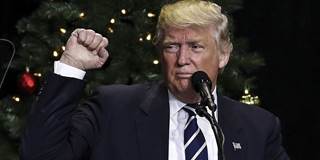Donald Trump's campaign for US president showed how politically rewarding ignorance and dishonesty can be. For the sake of democracy, action is needed to entrench basic norms of decency and transparency in vital election campaigns.
CAMBRIDGE – On January 20, 2017, Donald Trump will be sworn in as the 45th president of the United States. I say “sworn in,” rather than “assume the presidency,” because, under Section I of Article II of the US Constitution, Trump cannot actually become president unless he takes an oath of office, publicly committing himself to uphold the Constitution and perform to the best of his ability while in office. That is, of course, the case for all presidents. But, given how Trump comported himself during the campaign, it is particularly meaningful in his case.
Until now, Trump has made no effort to behave in an honest or reliable way. Technically, he didn’t have to. The US does not require any sworn statements from the men and women who run for president, nor does it have any enforceable code of behavior or constraints on the kind of rhetoric that can be used. Candidates may conduct themselves however they see fit.
This approach is based on the assumption that we can trust the candidates’ judgment. People seeking the country’s highest office should know how to balance the political imperative of winning votes with a sense of responsibility for the feasibility of – and reasoning behind – their policy promises.

CAMBRIDGE – On January 20, 2017, Donald Trump will be sworn in as the 45th president of the United States. I say “sworn in,” rather than “assume the presidency,” because, under Section I of Article II of the US Constitution, Trump cannot actually become president unless he takes an oath of office, publicly committing himself to uphold the Constitution and perform to the best of his ability while in office. That is, of course, the case for all presidents. But, given how Trump comported himself during the campaign, it is particularly meaningful in his case.
Until now, Trump has made no effort to behave in an honest or reliable way. Technically, he didn’t have to. The US does not require any sworn statements from the men and women who run for president, nor does it have any enforceable code of behavior or constraints on the kind of rhetoric that can be used. Candidates may conduct themselves however they see fit.
This approach is based on the assumption that we can trust the candidates’ judgment. People seeking the country’s highest office should know how to balance the political imperative of winning votes with a sense of responsibility for the feasibility of – and reasoning behind – their policy promises.